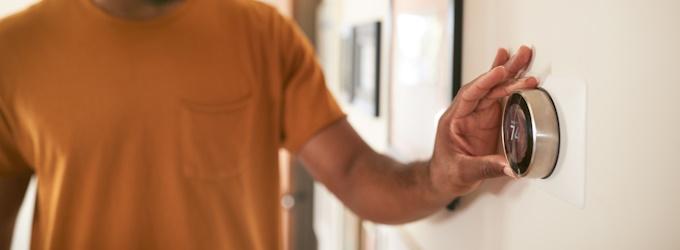Efficiently Heating Your St. Louis Home Starts with a Quality Thermostat
Your thermostat is one of the most crucial components of your home heating system, but it also happens to be one of the most overlooked. In many cases, homeowners suspect a problem with their HVAC when in fact the parts of the unit are just fine. The problem lies in the fact that they’re not being properly controlled by the thermostat.
This small, but impactful device is responsible for regulating temperature and keeps your heater from running constantly. Essentially the brains of your home heating system, a thermostat tells your unit when to turn on and off. It will trigger your furnace to start up when the temperature inside your home is below the desired level and direct it to stop distributing warm air once that level has been reached.
In this blog, experts discuss the relationship between your home thermostat and HVAC, common thermostat issues to look out for, and when to consider an upgrade.
How Your Thermostat Impacts Your Home Heating System
Your thermostat can be the difference between an efficient and inefficient home heating system. When it’s not working as it should be, it can cause your HVAC to switch on and off too frequently. This is often referred to as short-cycling and prevents your home from maintaining a consistent temperature.
Because your heater is running more than necessary, there’s also additional strain put on your system. This can eventually lead to costly home heating repairs and higher-than-normal energy bills.
To avoid this, you should replace the batteries in your home thermostat on a regular basis, check that the wires are securely connected, and clean the sensing element to keep dirt and dust at bay.
Other Signs of a Faulty Home Thermostat
Short-cycling isn’t the only indication that your thermostat is negatively affecting your home heating system. Here a few additional problems to be aware of:
-
Loose wiring: Most home thermostats have four wires. Two wires control the blower, while the other two power the heater itself. If you find that any of the wires are loose or broken, it’s best to seek the help of a professional to prevent further home heating repairs.
-
Uneven heating: Although there are multiple reasons you could be experiencing uneven heating throughout your home, a malfunctioning thermostat is a common culprit. When a thermostat is incorrectly calibrated, it will force your home heating system to turn off before your space has had enough time to get up to the set temperature.
This issue generally doesn’t require extensive home heating repairs, but your device should be recalibrated to achieve better temperature control.
-
Poor placement: Your thermostat’s location is more important than you might think! One that’s poorly placed is more likely to inaccurately read temperatures, resulting in your home heating system running at the wrong times and an uncomfortable indoor environment.
Home thermostats shouldn’t be exposed to direct sunlight, affixed to drafty exterior walls, or situated near appliances. For assistance with installation, reach out to a St. Louis heating specialist.
-
Software glitches: If you have a smart thermostat, it’s possible your device can experience software glitches that hinder your HVAC’s performance. Make sure to keep your user manual on hand, so you can troubleshoot any issues later on. If you’re unable to easily reboot your system, consider getting in touch with a home heating repair company or the thermostat manufacturer. They’ll be able to work with you to come up with the best solution.
When to Consider a New Thermostat for Your Home Heating System
No home thermostat lasts forever. Eventually, your device will need to be replaced. But knowing the right time for an upgrade can be tricky. You don’t want to install a new thermostat when your existing one can be repaired, but you also don’t want to have it fixed only for it to fail again within a matter of days.
In general, most thermostats last around 10 years. If your device is nearing the end of its useful life, it’s worth beginning your search for a replacement. Home heating system technicians have extensive experience working with a wide variety of thermostats and can offer recommendations on the latest options on the market.
You may also think about investing in a new home thermostat if your current one is non-programmable – even if nothing is visibly wrong with it. Modern, smart thermostats are not only more convenient, but they provide more accurate temperature monitoring as well. This means fewer fluctuations and less wear and tear on your HVAC.
For more information about optimizing your St. Louis heating system, contact a trusted, local expert.


